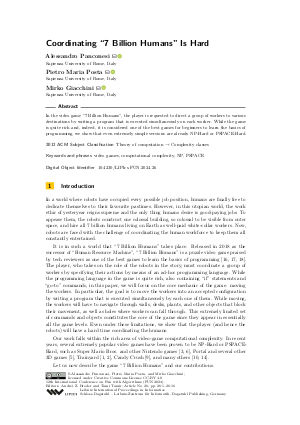Coordinating "7 Billion Humans" Is Hard
Authors
Alessandro Panconesi  ,
Pietro Maria Posta
,
Pietro Maria Posta  ,
Mirko Giacchini
,
Mirko Giacchini 
-
Part of:
Volume:
12th International Conference on Fun with Algorithms (FUN 2024)
Part of: Series: Leibniz International Proceedings in Informatics (LIPIcs)
Part of: Conference: International Conference on Fun with Algorithms (FUN) - License:
 Creative Commons Attribution 4.0 International license
Creative Commons Attribution 4.0 International license
- Publication Date: 2024-05-29
File

PDF
LIPIcs.FUN.2024.26.pdf
- Filesize: 1.28 MB
- 16 pages
Document Identifiers
Subject Classification
ACM Subject Classification
- Theory of computation → Complexity classes
Keywords
- video games
- computational complexity
- NP
- PSPACE
Metrics
- Access Statistics
-
Total Accesses (updated on a weekly basis)
0PDF Downloads0Metadata Views
Abstract
In the video game "7 Billion Humans", the player is requested to direct a group of workers to various destinations by writing a program that is executed simultaneously on each worker. While the game is quite rich and, indeed, it is considered one of the best games for beginners to learn the basics of programming, we show that even extremely simple versions are already NP-Hard or PSPACE-Hard.
Cite As Get BibTex
Alessandro Panconesi, Pietro Maria Posta, and Mirko Giacchini. Coordinating "7 Billion Humans" Is Hard. In 12th International Conference on Fun with Algorithms (FUN 2024). Leibniz International Proceedings in Informatics (LIPIcs), Volume 291, pp. 26:1-26:16, Schloss Dagstuhl – Leibniz-Zentrum für Informatik (2024)
https://doi.org/10.4230/LIPIcs.FUN.2024.26
BibTex
@InProceedings{panconesi_et_al:LIPIcs.FUN.2024.26,
author = {Panconesi, Alessandro and Posta, Pietro Maria and Giacchini, Mirko},
title = {{Coordinating "7 Billion Humans" Is Hard}},
booktitle = {12th International Conference on Fun with Algorithms (FUN 2024)},
pages = {26:1--26:16},
series = {Leibniz International Proceedings in Informatics (LIPIcs)},
ISBN = {978-3-95977-314-0},
ISSN = {1868-8969},
year = {2024},
volume = {291},
editor = {Broder, Andrei Z. and Tamir, Tami},
publisher = {Schloss Dagstuhl -- Leibniz-Zentrum f{\"u}r Informatik},
address = {Dagstuhl, Germany},
URL = {https://drops.dagstuhl.de/entities/document/10.4230/LIPIcs.FUN.2024.26},
URN = {urn:nbn:de:0030-drops-199342},
doi = {10.4230/LIPIcs.FUN.2024.26},
annote = {Keywords: video games, computational complexity, NP, PSPACE}
}
Author Details
References
-
Matteo Almanza, Stefano Leucci, and Alessandro Panconesi. Trainyard is np-hard. Theoretical Computer Science, 2018. FUN with Algorithms.

-
Matteo Almanza, Stefano Leucci, and Alessandro Panconesi. Tracks from hell — when finding a proof may be easier than checking it. Theoretical Computer Science, 2020. FUN with Algorithms.

-
Greg Aloupis, Erik D. Demaine, Alan Guo, and Giovanni Viglietta. Classic nintendo games are (computationally) hard. Theoretical Computer Science, 2015. FUN with Algorithms.

-
Emmanuel Arrighi, Henning Fernau, Stefan Hoffmann, Markus Holzer, Ismaël Jecker, Mateus de Oliveira Oliveira, and Petra Wolf. On the Complexity of Intersection Non-emptiness for Star-Free Language Classes. In 41st IARCS Annual Conference on Foundations of Software Technology and Theoretical Computer Science (FSTTCS 2021), 2021.

-
Erik D. Demaine, Joshua Lockhart, and Jayson Lynch. The computational complexity of portal and other 3d video games. FUN with Algorithms, 2018.

-
Erik D. Demaine, Giovanni Viglietta, and Aaron Williams. Super mario bros. is harder/easier than we thought. FUN with Algorithms, 2016.

-
Stefan Funke, André Nusser, and Sabine Storandt. The simultaneous maze solving problem. In Proceedings of the Thirty-First AAAI Conference on Artificial Intelligence, 2017.

-
Michael R. Garey and David S. Johnson. Computers and Intractability: A Guide to the Theory of NP-Completeness. W. H. Freeman and Company, 1979.

-
Luciano Gualà, Stefano Leucci, and Emanuele Natale. Bejeweled, candy crush and other match-three games are (np-)hard. 2014 IEEE Conference on Computational Intelligence and Games, 2014.

-
Graham Kendall, Andrew Parkes, and Kristian Spoerer. A survey of np-complete puzzles. ICGA Journal, 2008.

-
Dexter Kozen. Lower bounds for natural proof systems. In 18th Annual Symposium on Foundations of Computer Science (FOCS), 1977.

-
Klaus-Jörn Lange and Peter Rossmanith. The emptiness problem for intersections of regular languages. In Mathematical Foundations of Computer Science, 1992.

-
Walter J. Savitch. Relationships between nondeterministic and deterministic tape complexities. Journal of Computer and System Sciences, 4(2), 1970.

-
Giovanni Viglietta. Gaming is a hard job, but someone has to do it! In Fun with Algorithms, 2012.

-
Michael Wehar. Hardness results for intersection non-emptiness. In Automata, Languages, and Programming (ICALP), 2014.

- Commonsense review. https://www.commonsense.org/education/reviews/7-billion-humans. Accessed: 2024-02-26.
- Hackr review. https://hackr.io/blog/coding-games. Accessed: 2024-02-26.
- Hubspot review. https://blog.hubspot.com/website/best-coding-games. Accessed: 2024-02-26.
